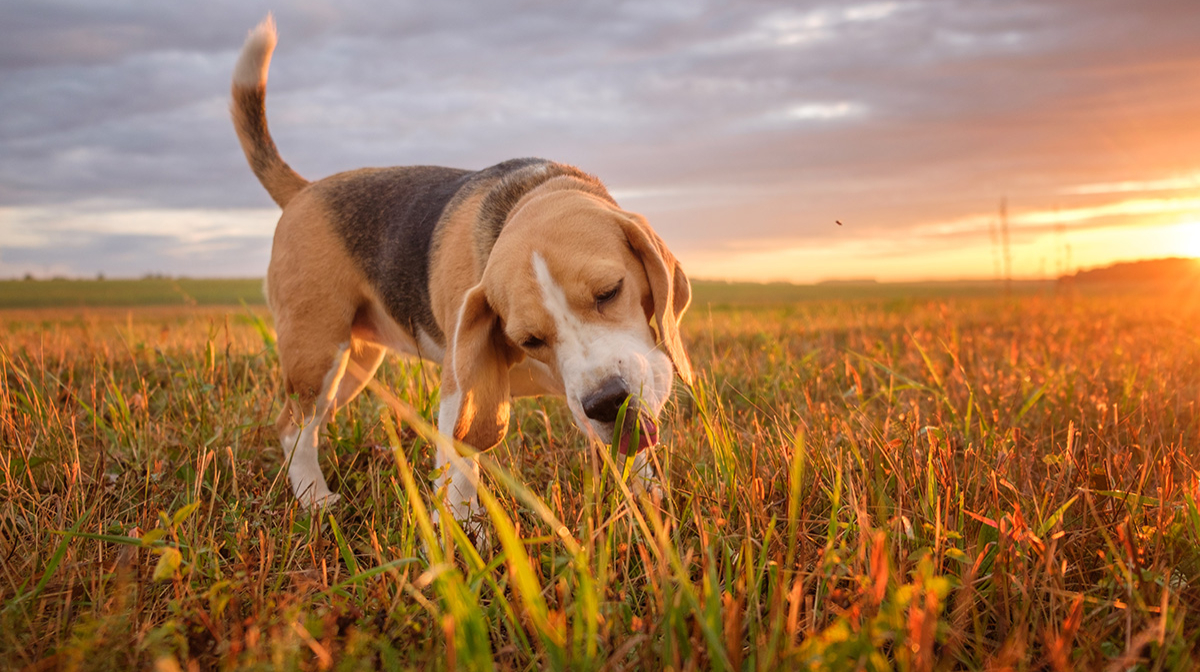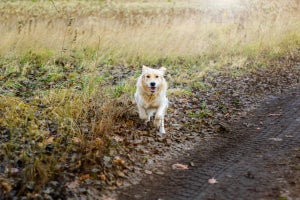
Your dog is an important part of the family, so you keep an eye on them for any signs affecting their health. You feed them quality food, and ensure they get plenty of exercise for a happy, healthy life. So, it can be confusing and worrying when your dog displays behaviours you don’t understand, like eating grass. Here, we explore the possible causes of this behaviour and explain how to keep your loyal buddy healthy.
Is it normal for a dog to eat grass?
Yes, dog eating grass is completely normal behaviour. The question of why dogs eat grass has puzzled pet owners for generations, but research confirms that most dogs sample grass without health problems. Wild dogs and wolves also graze on vegetation, suggesting this behaviour comes naturally to canines.
Dogs aren't strict carnivores. They're omnivores who benefit from varied diets. Their ancestors consumed entire prey animals, including stomach contents filled with grass and plants. This provided essential nutrients and fibre that modern dogs still seek instinctively.
Only 8-10% of dogs show illness signs before eating grass, and fewer than 25% vomit afterwards. These statistics debunk the common myth that dogs only eat grass when sick. Most grass-eating episodes happen because dogs simply want to, not because they need to purge their stomachs.
The behaviour appears more frequently in younger dogs, possibly because they explore the world through their mouths or have higher nutritional needs during growth periods.
Why is my dog eating grass? Possible reasons
They enjoy the taste and texture: It’s quite likely that your best friend is enjoying a snack for the same reasons you do: the pleasure of eating. It’s possible that he gets a hit of dopamine to the brain from chowing down on plants. This feel good chemical gives a boost that induces feelings of happiness and well-being – so you could assume that your dog is just enjoying indulging his appetite!
They need more fibre: Grass provides roughage that helps digestion by moving food through their system. If you suspect fibre deficiency, check our guide on fibre for dogs for better dietary sources.
They're bored or anxious: Your dog eating grass could be a sign that they are bored. This could be accompanied by other repetitive behaviours, like excessive grass eating. When anxious, your furry friend may graze as a self-soothing mechanism, similar to nail-biting in humans. This could easily increase if they’re stressed or when you spend less time with them.
They're trying to expel parasites: You may find your pet munching on the lawn, a behaviour likely inherited from wild ancestors. Wild canids sometimes eat grass to help clear worms, as the rough texture can act like a natural sweep. But don’t rely on grass-eating to deal with parasites. If you suspect your dog has worms, have them checked by a vet.
They want to vomit (sometimes): another reason why dogs eat grass is nausea, though research shows this accounts for only a small percentage of grass-eating incidents. Most dogs that vomit after eating grass weren't showing illness signs beforehand, suggesting the grass itself caused stomach irritation.
Do dogs eat grass when they are sick?
Before worrying about why your dog eats grass, consider that if they only do it occasionally, it wouldn’t indicate illness. However, sudden changes in grass-eating patterns or accompanying symptoms warrant attention. While the worrying question, why does my dog eat grass, often has innocent explanations, persistent changes should be investigated.
Watch for increased grass consumption paired with other concerning signs. Dogs that frantically devour large amounts of grass, especially if they're also refusing normal food, may have stomach upset or other medical issues.
If you can’t find any reason to doubt their good health, the reason why your dog eats grass could be just that they consider it a casual pastime. The behaviour becomes worrying when it turns compulsive or occurs alongside appetite loss, lethargy, or digestive problems. Context matters more than the grass eating itself.
When to see the vet
Schedule a veterinary consultation if you notice these warning signs alongside why your dog is eating grass concerns:
Refusing normal food but still eating grass: This suggests possible stomach upset or nausea
Repeated vomiting: Occasional vomiting may be normal, but frequent episodes need investigation
Signs of illness like lethargy or diarrhea: These symptoms combined with grass eating may indicate underlying problems
Excessive or compulsive grass eating: Frantic or obsessive behaviour differs from casual grazing
Remember, consulting your vet is precautionary, not emergency care. These signs could point to underlying issues like intestinal parasites, dietary imbalances, or digestive disorders. If your dog isn't eating their regular food, this deserves attention. Finding a vet for your dog instantly assures you of appropriate care for your beloved pet.
Is grass dangerous for dogs?
Plain grass isn't dangerous, but what's on it can harm your pet. Many lawns receive chemical treatments that pose serious risks to dogs. Pesticides, herbicides, and fertilisers can cause poisoning if ingested, leading to symptoms ranging from stomach upset to more severe toxicity.
Parasites present another concern. Lungworm larvae can be transmitted through snails and slugs that live on grass. Dogs eating grass may pick up these parasites, which can cause respiratory problems and other health issues. So, here’s where the reason why your dog is eating grass becomes more concerning.
Chemical residues also persist on treated lawns for days or weeks after application. Even small amounts can accumulate in your dog's system over time. Keep your pet away from recently treated areas and always maintain current worming treatments as preventive measures.
Other than grass itself, gardens often contain plants that are genuinely toxic to dogs. Familiarise yourself with toxic plants for dogs to keep your pet safe during outdoor adventures.
How to stop your dog from eating grass
Since the reasons why dogs eat grass rarely point to serious problems, you may not need to stop this behaviour entirely. However, if excessive grass consumption concerns you, several strategies can help reduce it effectively.
Increase daily xercise and mental stimulation first as boredom is another reason why you may find your dog eating grass. Bored dogs often develop repetitive behaviours, including excessive grazing. Interactive toys, puzzle feeders, and longer walks can redirect their energy toward more appropriate activities.
Check your dog's diet for potential gaps. While complete dog foods should provide all necessary nutrients, individual dogs may benefit from dietary adjustments. Consult your vet before making changes rather than guessing at deficiencies.
Training helps too. Teach a reliable "leave it" command during walks and yard time. Reward your dog for ignoring the grass in favour of approved activities or treats.
Most importantly, avoid chemically treated areas completely. Even if you can't eliminate the behaviour, you can control what type of grass your dog accesses.
What is a dog lacking if they eat grass
The answer to why your dog eats grass could hint at missing nutrients, particularly fibre deficiency. However, determining the specific nutritional gap requires professional assessment rather than guesswork.
Quality complete dog foods should provide all essential nutrients in proper proportions. If your dog consistently seeks grass despite a balanced diet, discuss this with your veterinarian before making dietary changes. They can evaluate whether additional superfood supplements or different food formulations might help.
Sudden increases in grass consumption may indicate digestive issues or other health changes. Professional guidance ensures you address the real cause rather than just treating symptoms through random dietary modifications.
The truth behind your dog’s grass habit
Understanding why dogs eat grass comes down to this: it's usually normal behaviour with multiple possible explanations. Your dog might enjoy the taste, follow ancient instincts, or seek specific nutrients their diet lacks.
You may start to worry about why your dog eats grass when casual grazing becomes obsessive or pairs with illness symptoms like persistent vomiting. Otherwise, occasional grass eating requires no intervention beyond ensuring your pet avoids chemically treated areas.
Stay alert to changes in frequency or intensity. When in doubt, veterinary consultation provides peace of mind and professional insight into your individual dog's needs.
Want to find out more on what your dog can and can’t eat? Check out our dog nutrition blog here.









